Search intent is the purpose of a user’s search. It’s also referred to as audience, user, or keyword intent.
With Google Hummingbird, Google RankBrain, and other algorithm adjustments, Google automatically interprets search intent and shows users results that align with it. The search engine often uses rich snippet results like the Answer Box and Knowledge Panel.
Because people’s queries reflect where they are in the conversion funnel, understanding search intent can help you create effective content that targets potential customers.
Why Is Search Intent Important to SEO?
How well you understand search intent impacts your ability to rank and whether your readers are satisfied with your page’s content. Google even goes into detail about intent in their Quality Evaluator Guidelines.
How frustrated would you be if you wanted to learn about how motorcycles work, but all your search results tried to sell you one instead? That experience is what you’re trying to prevent by adding user intent into your SEO strategy.
A thorough understanding of search intent can help you:
Do more effective keyword research by targeting search terms that align with your business’s and your audience’s needs. Create content that answers user questions and structure pages in a way that’s friendly to both users and search engines. Rank higher by creating content that search engines understand to be more valuable and relevant to their usersThe 4 Types of Search Intent
While they often overlap, you can break search intent down into four basic categories:
Navigational intent: Trying to find something (e.g., “Subaru website”) Informational intent: Trying to learn more about something (e.g., “What’s a good car?”) Transactional intent: Trying to complete a specific action (e.g., “buy Subaru Forester”) Commercial intent: Trying to learn more before making a purchase decision (e.g. “Subaru vs. Nissan”)These can roughly align with your audience’s buyer journey.
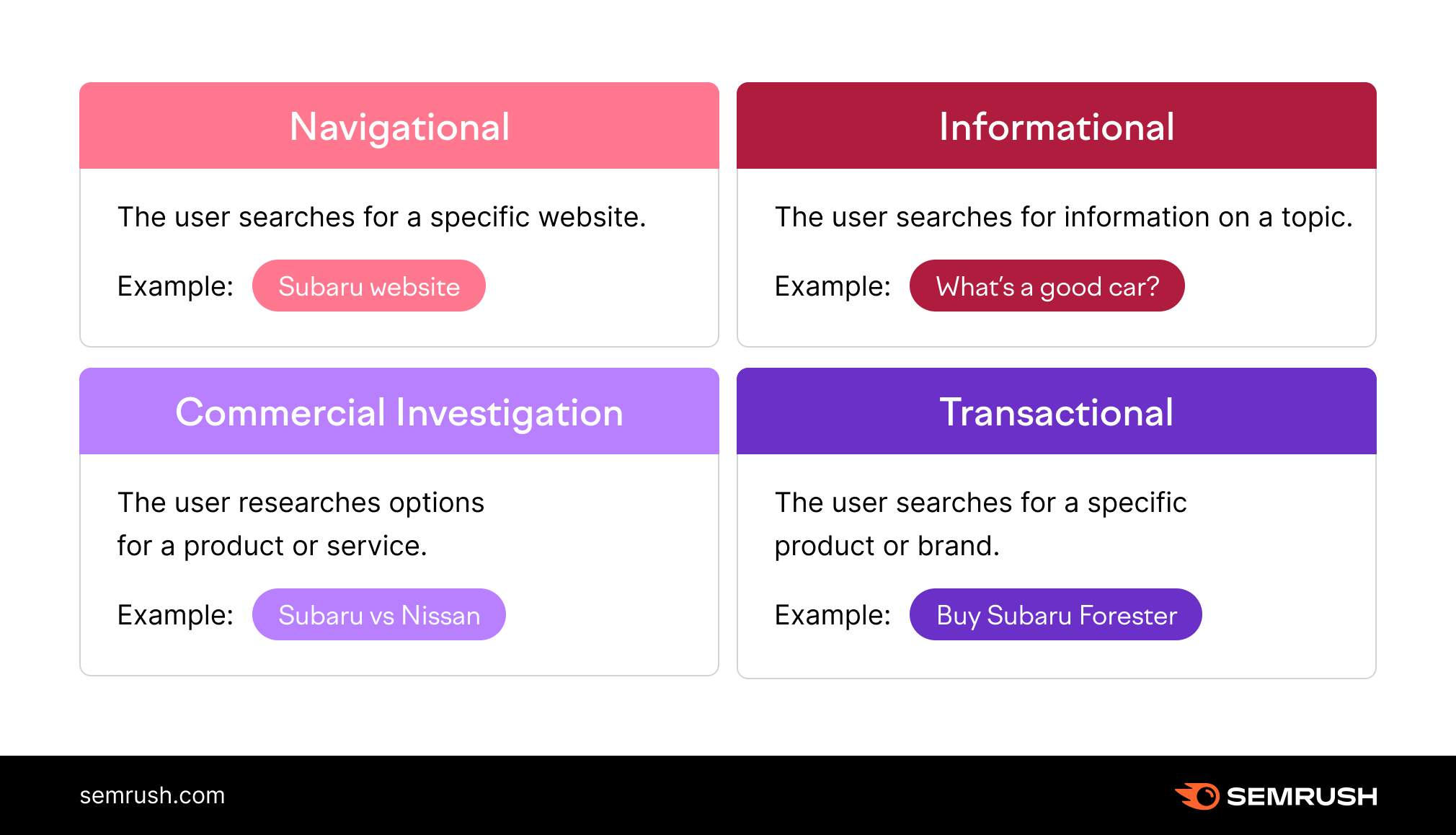
Users will probably use informational keywords when first getting to know you. When they’re warming up to you, considering a purchase, they might start using commercial keywords. And when they’re ready to convert, that’s where transactional keywords come in.
Below, we’ll cover each type of search intent in detail, how they’re relevant, and how to target those keywords with content.
Navigational Search Intent
Navigational intent means that the user wants to find a specific page, domain, or physical address. It overlaps with Google’s “visit” and “website” user intents and includes local search.
The key to understanding navigational intent is that users already know what they’re trying to find. So if you’re targeting a keyword like this, you probably don’t need to sell them on something new.
For their part, Google’s mission is to deliver it to them in the most efficient way possible. To do so, Google uses SERP features like knowledge panels or local packs. For example, here’s a navigational search looking for a physical location.
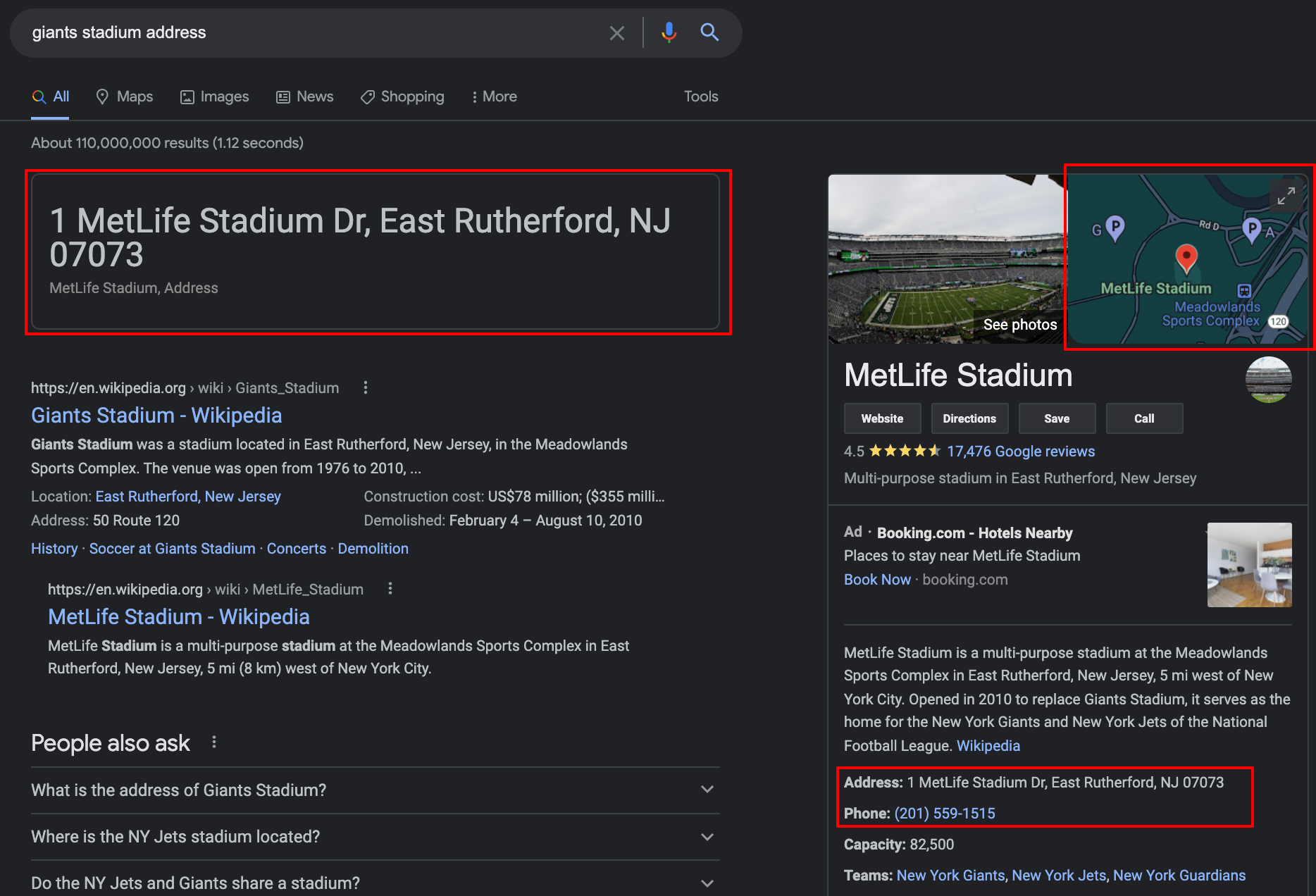
In this example, the user looked for the stadium’s address where the New York Giants play. Notice how the snippet shows them the address they’re looking for without requiring them to leave the page. The knowledge panel provides more context, including a link to Google Maps and a phone number.
For a search phrase like this, make sure your local listings are correct and up-to-date. Additionally, ensure your location and contact information are easily accessible on your website.
Here’s another example where the navigational intent is a little more ambiguous.
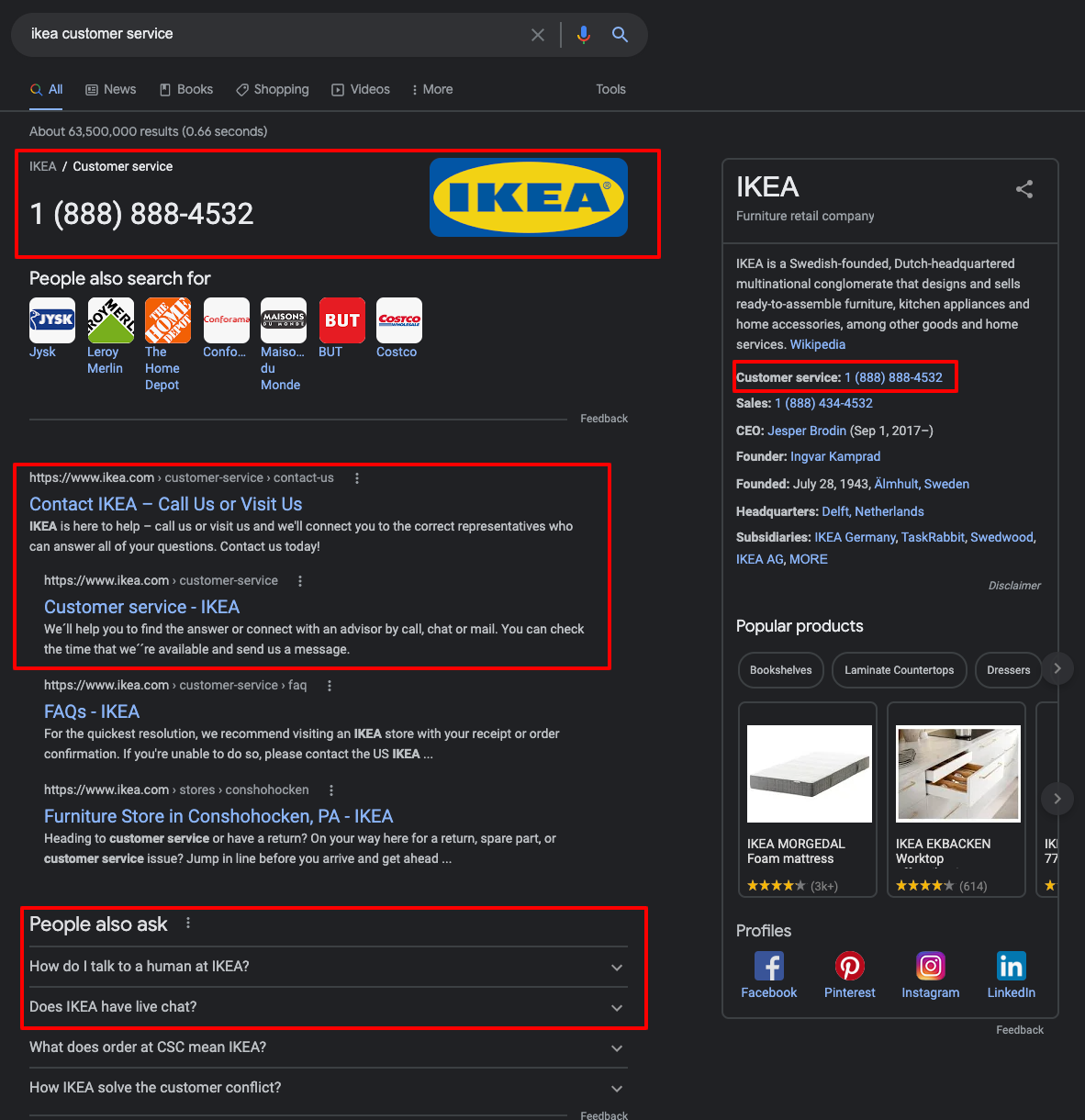
Here, the user searched for “IKEA customer service.” However, it’s not immediately clear whether they wanted to find that section of the IKEA website, a phone number, or other related information. In this case, the SERPs delivered the phone number in the snippet. The search results linked to the company’s customer service page and a People Also Asked section offered more specific related queries.
Why It’s Relevant for Your Business
Navigational keywords are all about ensuring your current or future customers can find you when they need you most. Often, they’re branded. They can also give you insight into how users interact with or think about your brand.
For example, if the vast majority of queries are for a specific product page, it’s probably popular among your audience. Conversely, if you see a sudden spike in, say, customer service searches, it might be worth investigating why.
How to Optimize for Navigational Intent
First, make sure your site’s structure is organized and easy to navigate to target navigational keywords. Each section of your site should be clearly labeled, with page titles, tags, headers, and descriptions that tell the user what information they’ll find there.
Make sure each product or service you offer has a dedicated effect or landing page containing all the most relevant information. Optimize each page using the appropriate brand and product names. Add other applicable terms (e.g., the type of product or the problem it might solve).
Finally, optimize your URLs to be descriptive and easy to read.
Informational Search Intent
Informational search intent means that the user wants to learn something. Often, users phrase these searches as questions and use words like who, what, where, why, and how.
Questions asked can range from extremely specific (“how old is Madonna?”) to broad or complex (“critical analysis of The Illiad”).
For more specific queries with concrete answers, Google will often use SERP features to answer the question so users won’t have to leave the page:
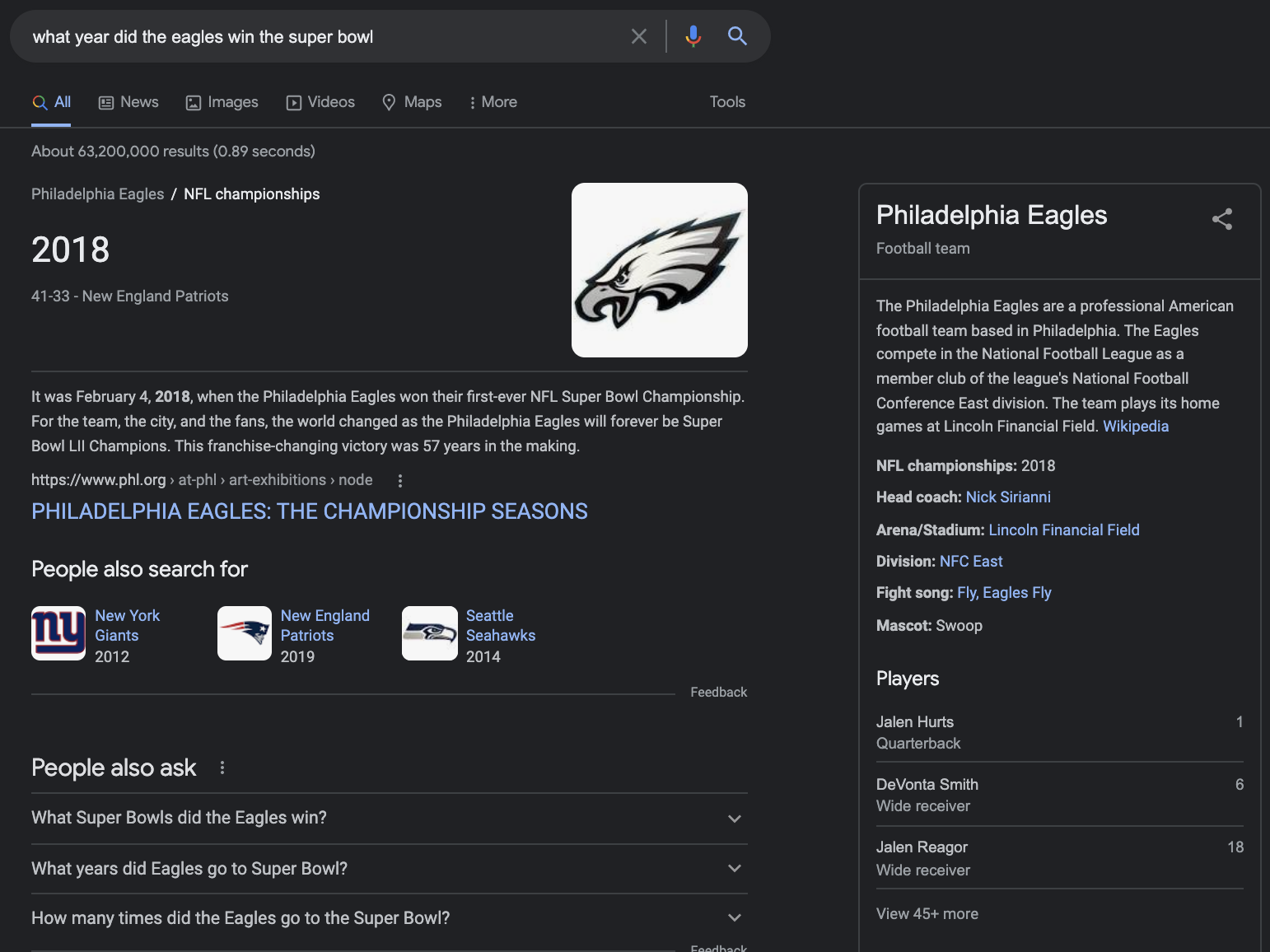
In the above example, note how Google answers the question (“what year did the eagles win the Superbowl”) at the top of the page. Google provides additional context in the knowledge panel to the right and the People Also Ask box.
Why It’s Relevant to Your Business
Informational queries make up the vast majority of searches performed on Google. If you want visibility, you can’t afford to ignore them. That said, they can still be a valuable opportunity to grow your business.
Providing your audience with informational or educational content is a great way to build trust in your expertise. In addition to increasing your visibility, you can use this content to target new leads you can convert later.
How to Optimize for Informational Intent
To target keywords with informational intent, pay close attention to the information users are searching for. Write your content to provide it as clearly as possible.
For example, a “how-to” query typically looks for a structured process. Here’s the SERP feature for the term “how to start writing a book:”
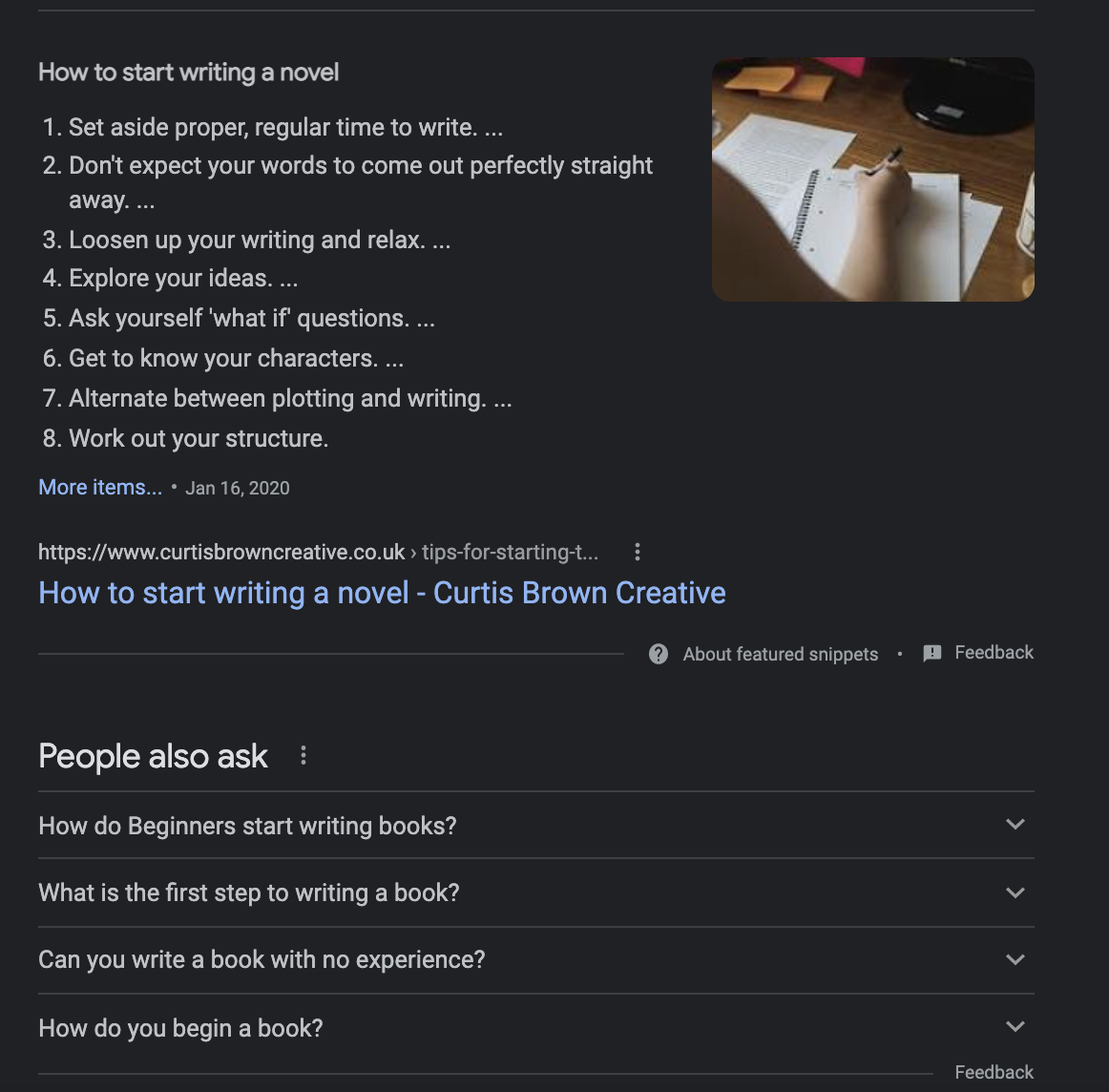
Notice how the featured content appears as an ordered list, with clear, numbered steps. If you click through to the source, you'll notice that each numbered step is a subheader with detailed information below it. Google used these headers to assemble the rich snippet.

If you wanted to write your own “How To” blog post, it would look something like this:
<H1> How To Make a Sandwich</H1>Here, you'd write an introduction. With the H1, you've established the question your post will answer.<H2> Step 1: Choose Your Bread</H2><p>In the body of your text, expand on each step listed in the adjacent H2. Include details about the process and other important information to consider.</p>Whatever the topic or question type, make sure you’re structuring it properly if you’re writing informational content. Wherever you can, include essential information, such as steps or answers to questions, in your page title, description, and headers. You can then use other text elements like lists, charts, and graphics to present your information more reader-friendly.
Transactional Search Intent
Transactional search intent means users want to do something specific, either in person or using their device. Despite what the name implies, this isn’t restricted just to purchases. A user doing a transactional search might also want to complete email signup, form submission, store visit, or a phone call.
Some transactional queries are direct, making what the user is trying to do obvious. For example, a user in Philadelphia, PA, who wants to go see a movie might search “movies near Philadelphia pa:”
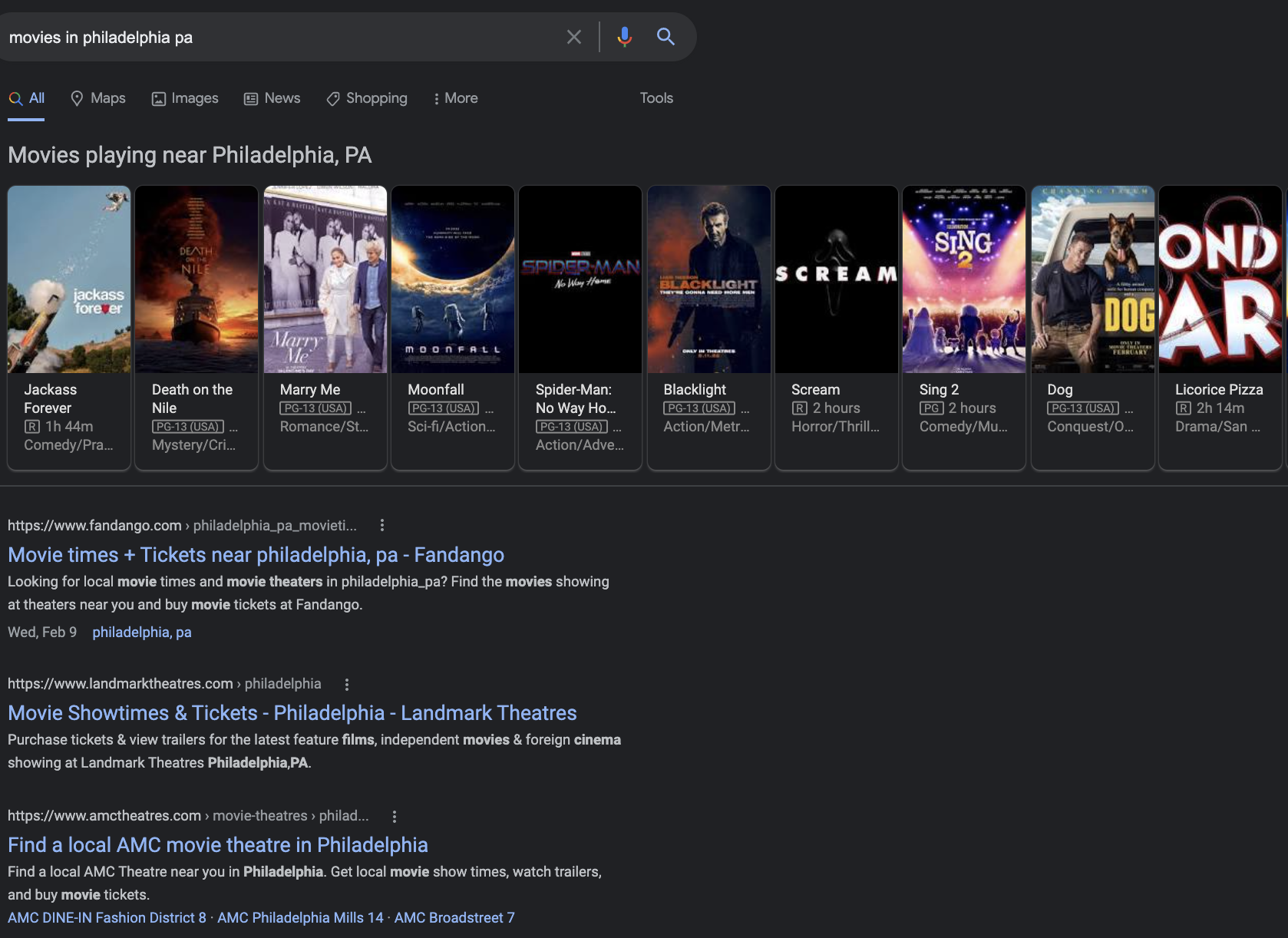
Here, Google returns a carousel of movies playing in local theaters and websites where users can find more information or buy tickets. If they click on a movie they’re interested in, they can browse individual showtimes and even purchase tickets on their favorite site:
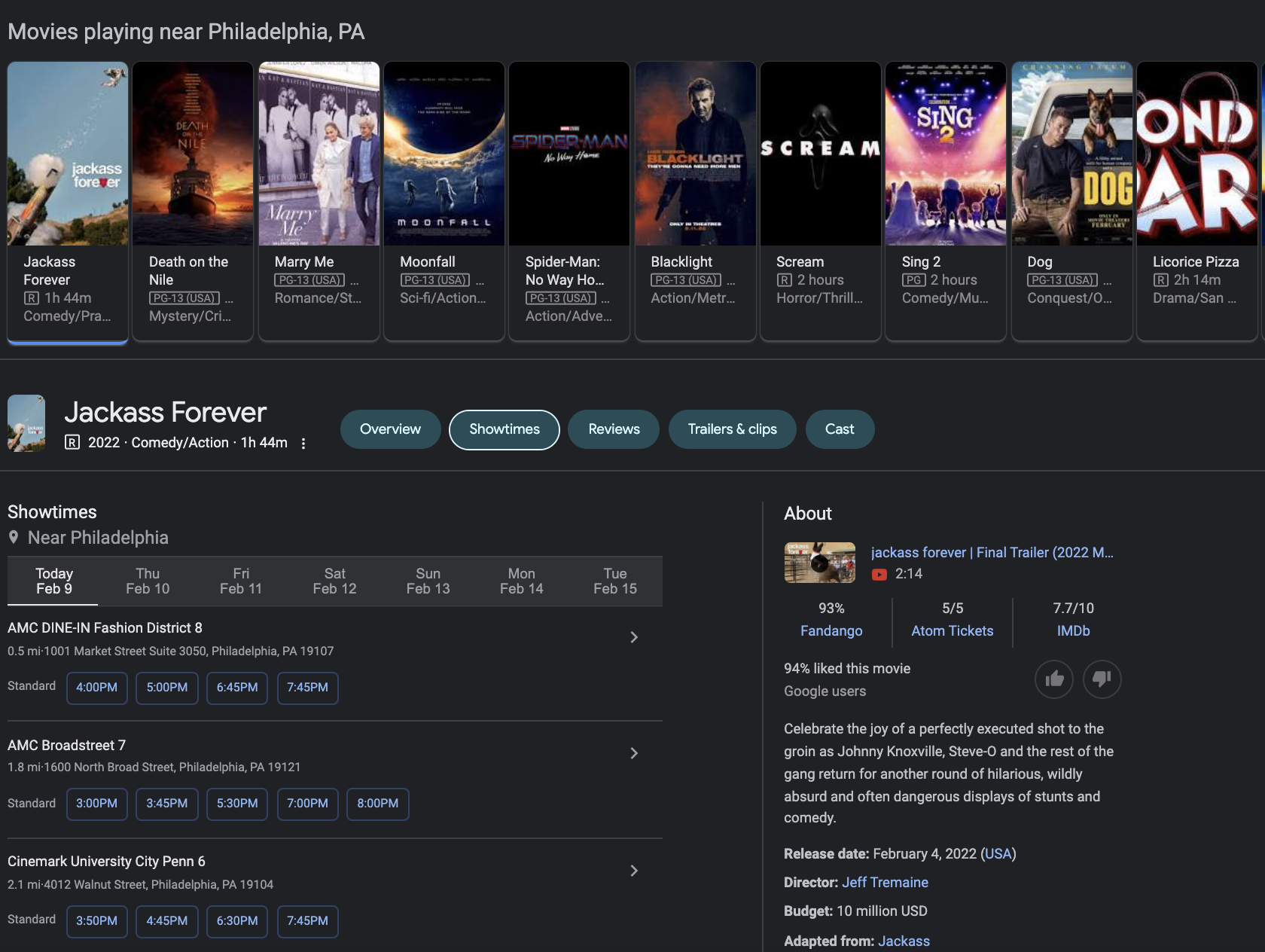
Other times, it’s unclear whether a user’s intent was transactional, commercial, or informational. This often happens when the search term is the name of a specific product. In that case, the search results will include various SERP features to help research that product or complete their purchase.
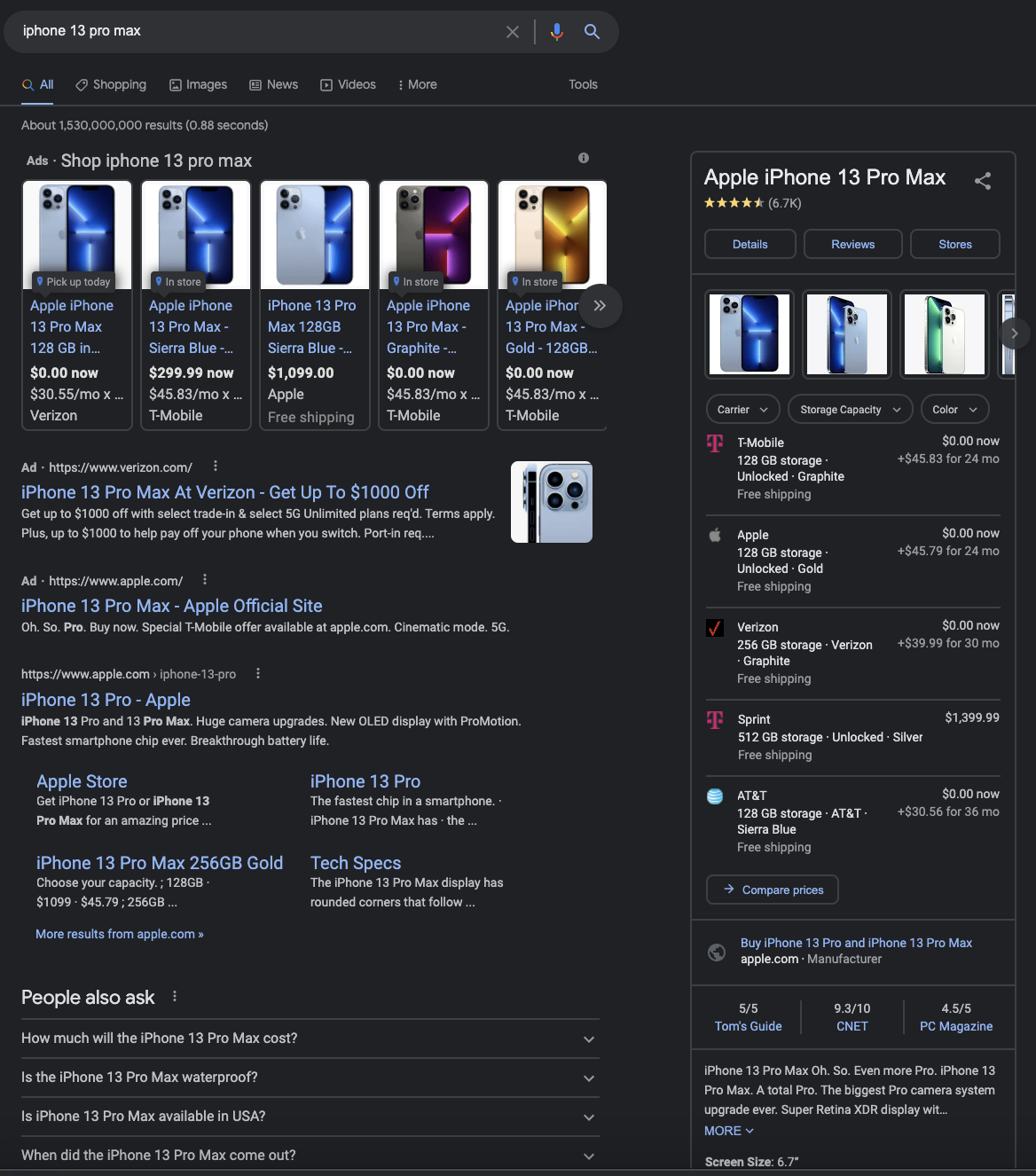
In this example, the knowledge panel contains transactional content (comparing prices at different outlets) and commercial (basic product information, user reviews and ratings, and questions about the product).
Why It’s Relevant for Your Business
Transactional keywords are your money makers. These are the keywords your future customers use when they’re ready to convert, whatever conversion means for you.
Seize your opportunities by targeting transactional keywords with an optimized product landing page and an easy purchasing process.
How to Target Transactional Keywords
Targeting transactional keywords means:
Knowing what conversion means for you (Do you want them to register? Buy something?) Providing all the most relevant information in the most user-friendly way you can Making the conversion process as straightforward as you canYou want this process to be seamless, whether they’re starting on your site or Google. To do this, make sure all relevant pages are easy to find and contain all necessary information for users to complete the desired action.
First, make sure you’re directing users to a page designed for this purpose, whether it’s a product or a landing page. This page should have:
Page Title, Description, and Headers that include your keywords and indicate the purpose of your page. A Clear CTA that’s easy for users to spot and understand A Clear Design that helps users find the information they need quickly and complete their conversion easily Conversion optimized text that simplifies the decision process by providing the most critical information in an engaging wayFinally, use structured data to help Google better understand what’s on the page, so it can deliver it to users when they’re ready to convert. You can learn more about using structured data in this guide to technical SEO.
Commercial Search Intent
Commercial search intent is like a hybrid of informational and transactional. In other words, these are the keywords your audience uses when they’re doing their research before making a purchase decision.
Let’s say, for example, you’ve decided to buy a new phone. You’re not sure if you want to spring for a new iPhone or a Samsung Galaxy, so you search for “iPhone 13 vs Samsung s21:”
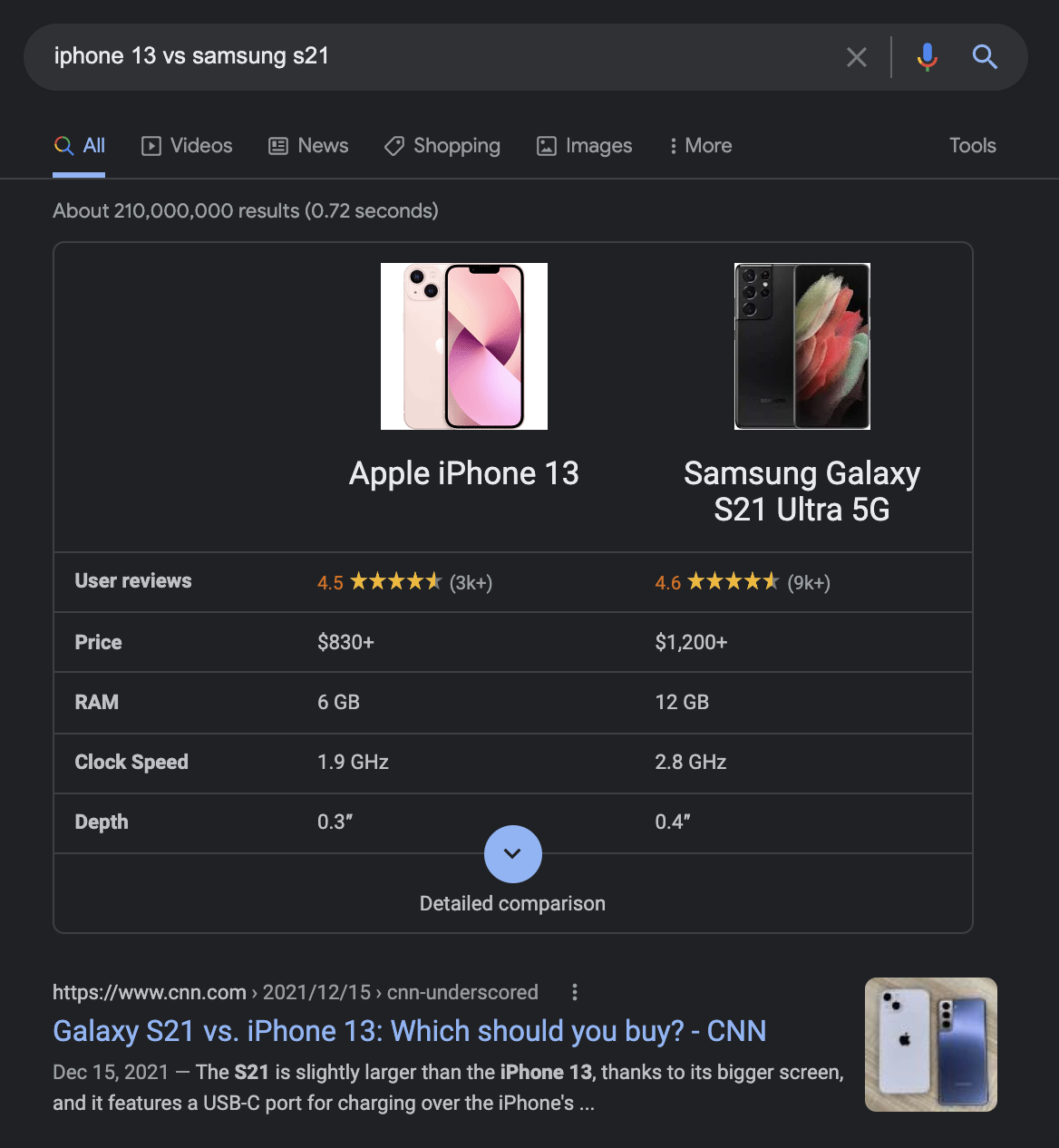
For a search like this, the SERP feature compares both products so that users can easily make their purchase decision. If you expand it, you can find even more details:
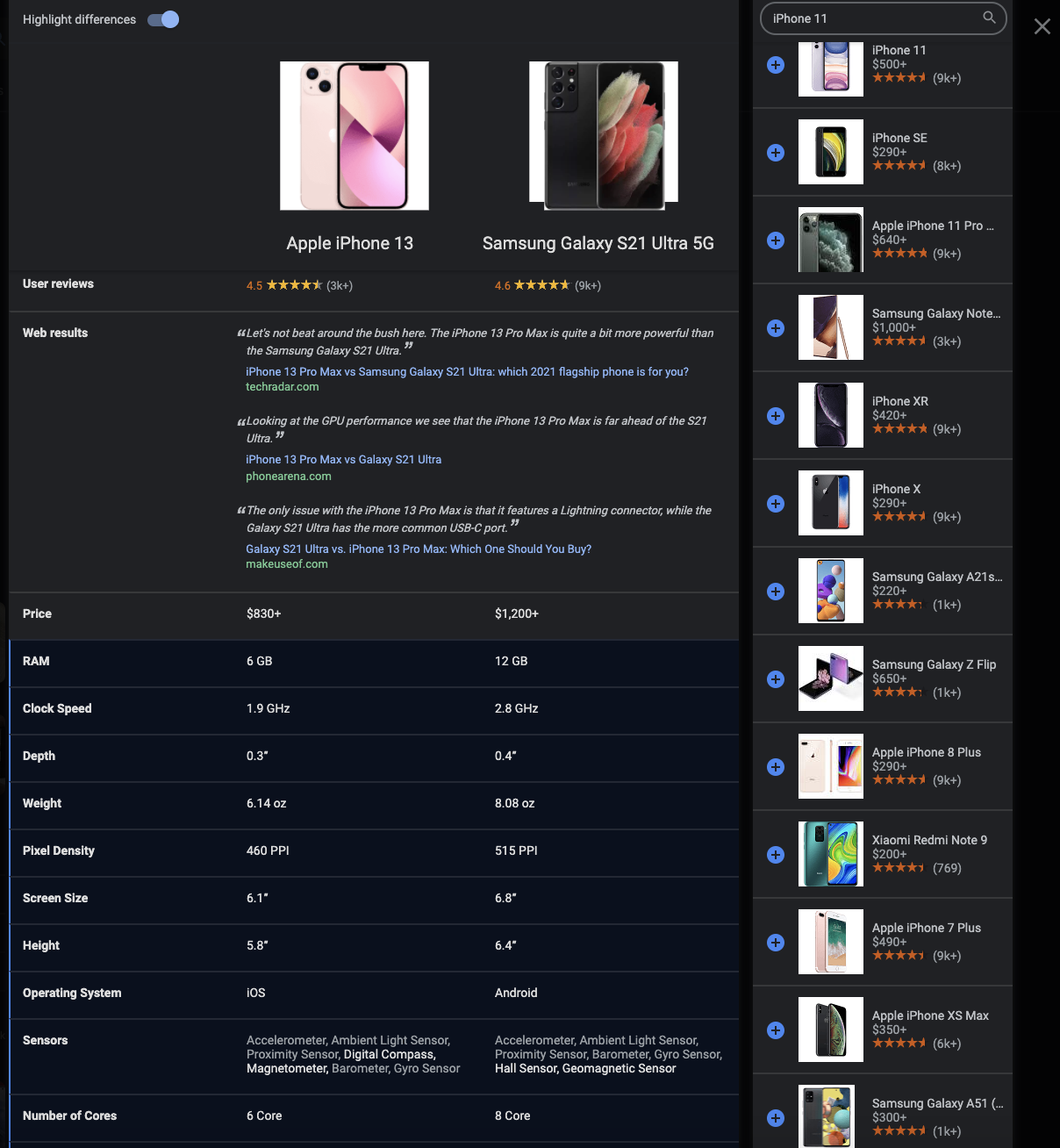
Of course, product comparisons aren’t the only type of commercial search. Users might also look for:
Reviews from users or authoritative sources Technical specifications or other details Brand agnostic recommendations (e.g., “best phones 2022”) Free trials or product demonstrations Other pages that help them learn about a product or serviceWhy It’s Relevant for Your Business
Commercial keywords are all about showing your audience what you have to offer and giving them the information they need to convert. The more efficiently your audience can find and use this information, the more likely they will move forward.
With these keywords, you’re staying connected with your user during one of the most important parts of their buyer journey.
How to Optimize for Commercial Intent
Like informational keywords, you want to target commercial keywords; you need to know what the user is asking for. Then, structure your page so that users can find the answer as efficiently as possible.
For example, here’s how Apple’s site compares the iPhone 13 with the iPhone 13 Pro:
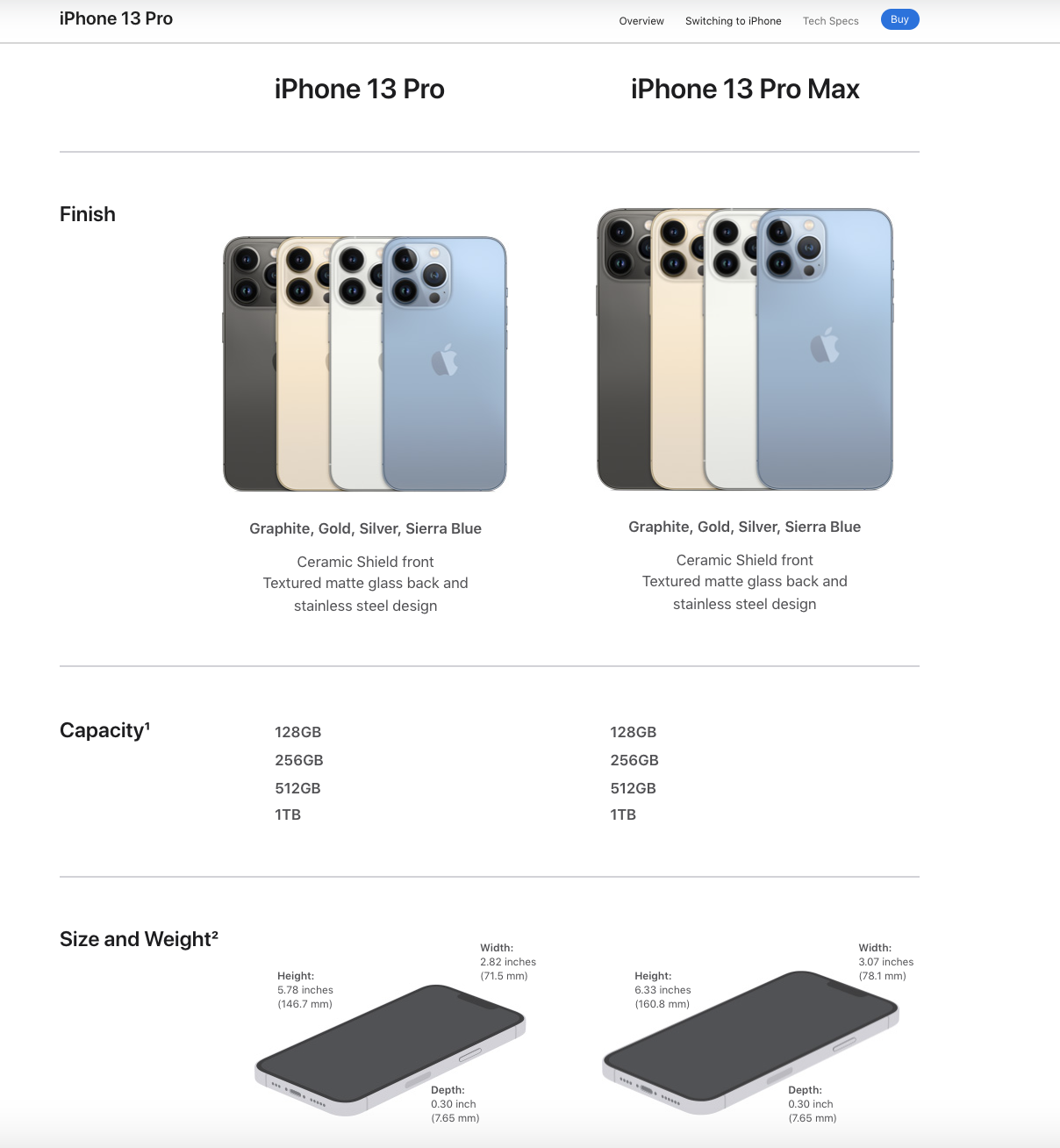
Because the page’s objective is to compare two similar products, it’s formatted as a table, with equivalent information on both sides and plenty of visuals. This way, users can quickly find differences or the details they care about most.
Here’s another example of well-structured commercial content:
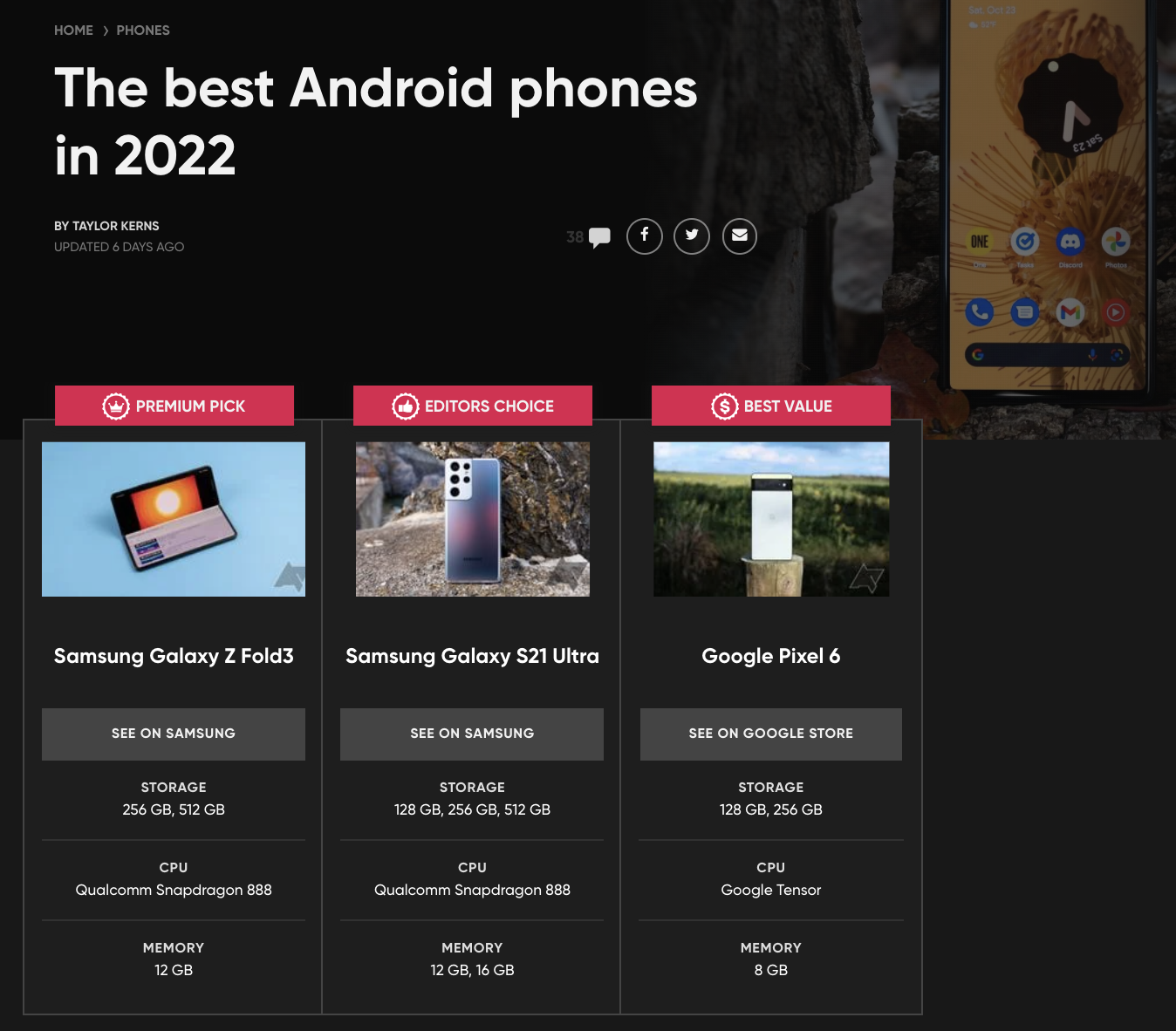
Android Police’s article, “The Best Android Phones in 2022,” opens with a quick snapshot of their conclusion. Their three top pics are also displayed in a table so users can easily compare relevant information.
The article continues by dedicating a header to each phone:
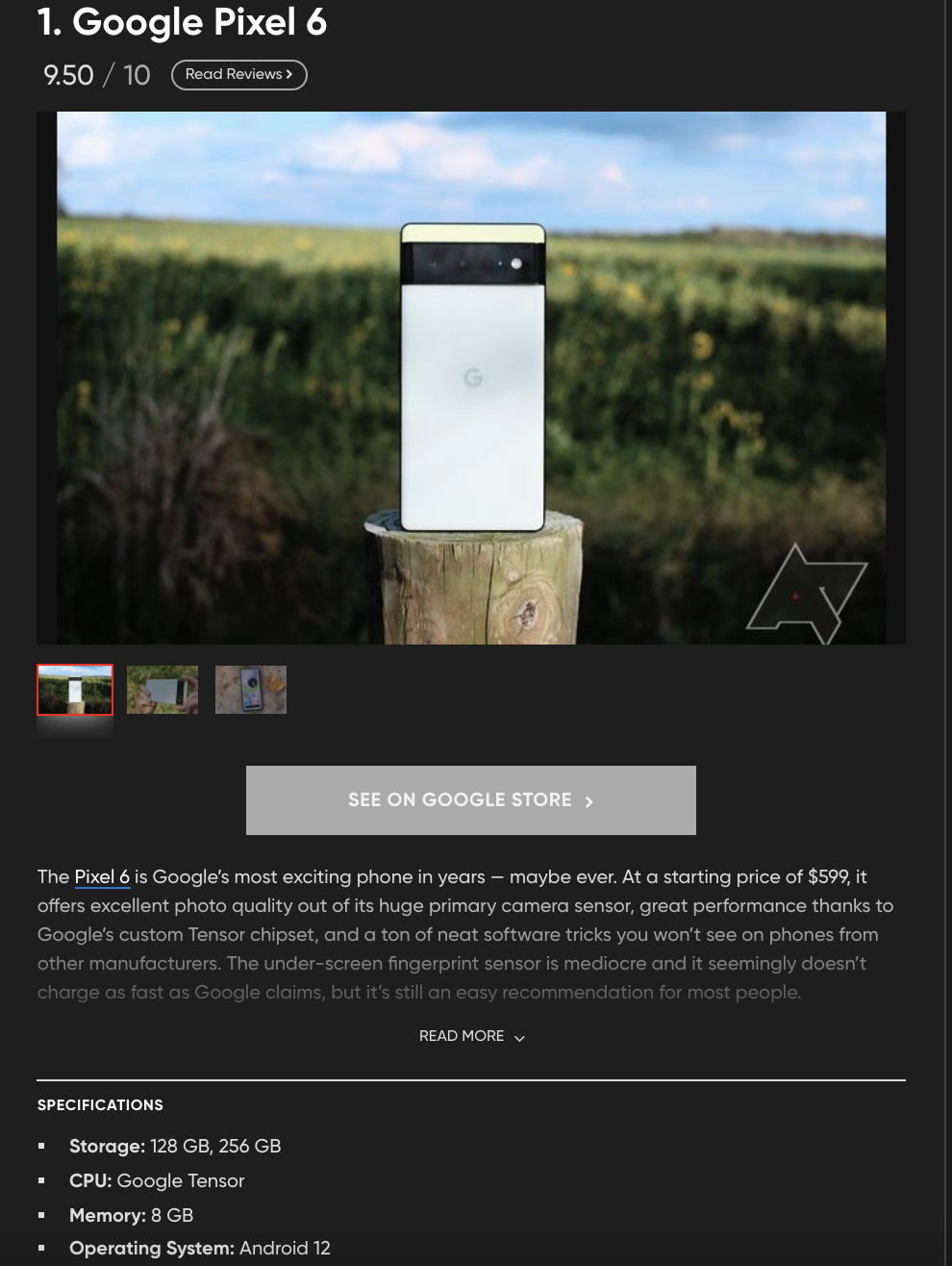
Note how the most important information is the most prominent. The name of the phone, the rating, and a link to reviews are all displayed on top, followed by the technical specs and other details. Users can also expand if they want to learn more about why the editors came to their conclusion.
In both examples (Apple and Android Police), the commercial content was structured, highly organized, and reader-friendly. Users could educate themselves quickly and make a seamless purchase decision.
Use a similar philosophy for commercial content on your site. Ask yourself first, what is my audience trying to find on this page? Then build a well-structured page with that need in mind.
Next, optimize it with descriptive page titles, headers, meta descriptions, and URLs.
Finally, make it as easy as possible for them to purchase, with links to more information, lead generation forms, or purchase pages.
How to Determine Search Intent from Keywords
Determining search intent is a crucial step in any content strategy. Why? Because, as stated above, search intent often aligns with where users are in the marketing funnel.
Here’s how it usually works:
Awareness: Informational keywords like “how to do keyword research.” Consideration: Commercial keywords like “best keyword research products.” Conversion: Transactional or navigational keywords (often branded) like “Semrush subscriptions.”In many cases, you can determine a keyword’s intent based on the keyword itself and its search results.
For example, an informational keyword will often use question words or be phrased to indicate what the user is learning. The results might include a snippet answering the user’s question. Similarly, a commercial transactional keyword is likely to reference a specific product or type of product. These queries might generate a carousel of products, user reviews, or links to retailers.
That said, you don’t have to figure it out yourself. Instead, you can use Semrush to find search intent during your keyword research. Using the Keyword Magic tool, you can filter by search intent and target only those that align with your goals:
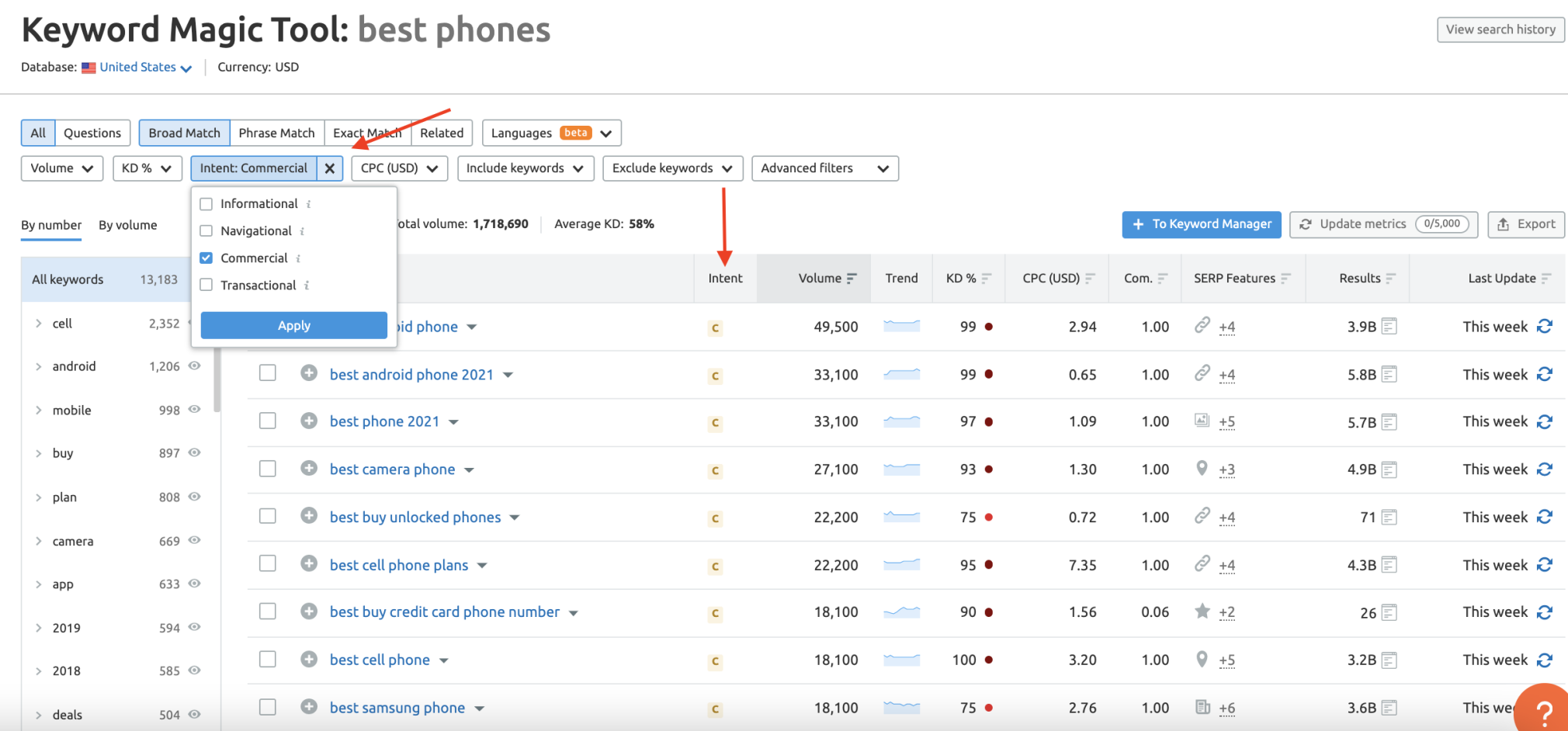
If you’re researching a single keyword, you can also find this information in Keyword Overview:
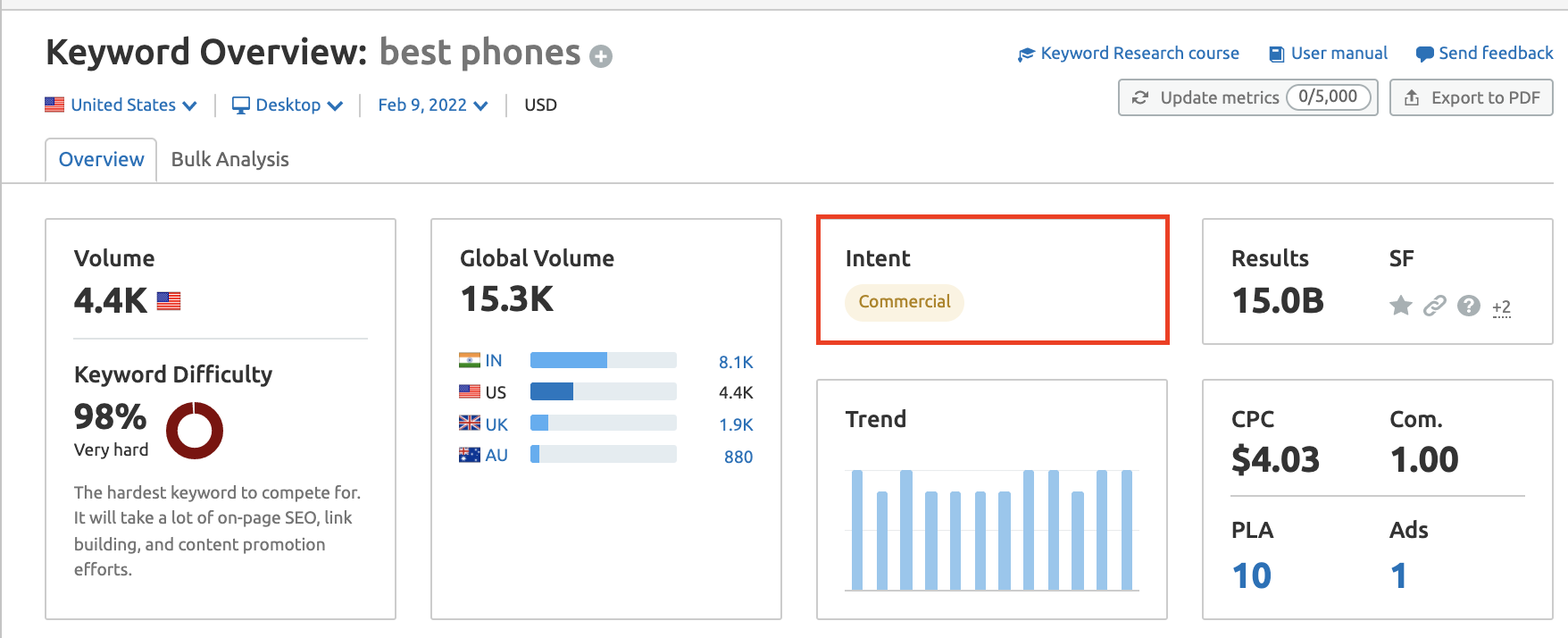
You can create a more targeted content strategy to connect with your audience more effectively and rank higher using these insights.
SEO Benefits of Intent Targeting
Search intent is a massive part of how semantic SEO delivers relevant search results to users. Better intent optimization can drive more relevant and qualified traffic to your website.
This could mean improved conversion rates for your landing pages, and a host of other benefits to all content types, including:
Reduced bounce rates: People get what they want, so they stay on your pages. More page views: Meeting a user’s intent makes them more likely to engage with the rest of your website. More featured snippets: Having your content selected for Google’s rich snippets can significantly benefit you. It allows your pages to rank in position 0 above the first search result. Wider audience reach: Google is smart enough to interpret multiple queries with the same topic and intent. That means it will show your optimized page for a lot more questions.These benefits are what make intent optimization so robust. Do it right, and you will see larger audiences, more qualified traffic, and better engagement metrics for your content.
Final Thoughts
Ultimately, an effective website provides users with the information they need right when they need it most. Informational content helps users to educate themselves on important topics to them. Commercial content helps them make more informed purchase decisions. And by targeting transactional and navigational keywords, you can help them find you quickly when they’re ready to convert.
Find out more about how Semrush can help you analyze search intent. Then start researching and building a content strategy that effectively serves your audience.
Innovative SEO services
SEO is a patience game; no secret there. We`ll work with you to develop a Search strategy focused on producing increased traffic rankings in as early as 3-months.
A proven Allinclusive. SEO services for measuring, executing, and optimizing for Search Engine success. We say what we do and do what we say.
Our company as Semrush Agency Partner has designed a search engine optimization service that is both ethical and result-driven. We use the latest tools, strategies, and trends to help you move up in the search engines for the right keywords to get noticed by the right audience.
Today, you can schedule a Discovery call with us about your company needs.
Source:





